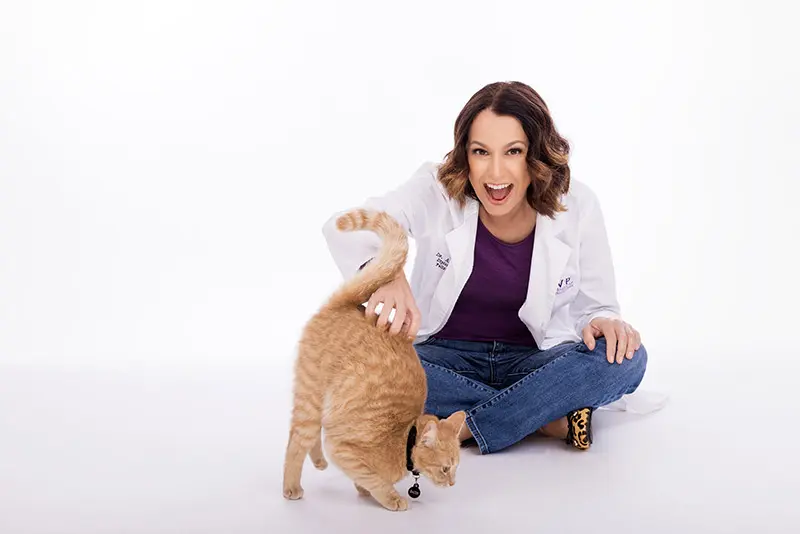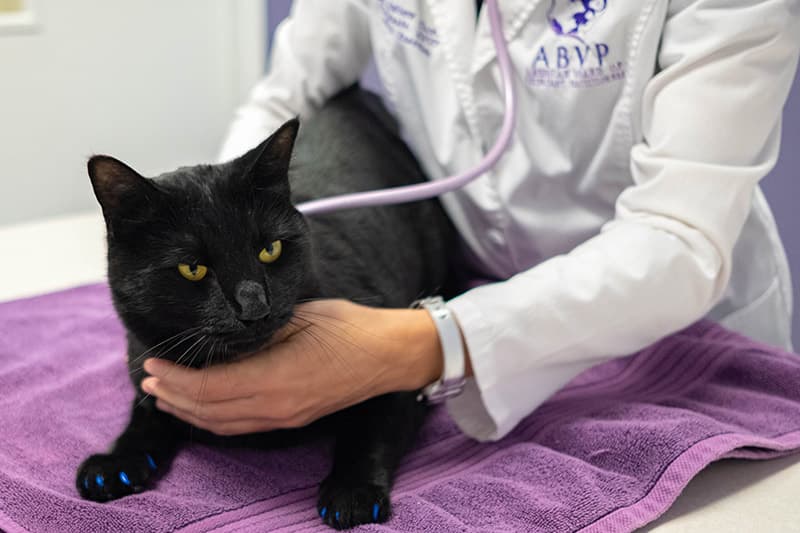Contagious or not?
When your cat is sick, you may wonder if you or your family members can catch what she has. Most of the diseases and conditions that cats get are not contagious to humans. For example, a kitty “cold” is NOT transmittable to humans. However, there are certain illnesses that may be transmitted from cats to humans (called a “zoonotic” disease). There are also many diseases that “can” be transmitted but with proper precautions (usually common sense ones) are unlikely to be transmitted.
Depending on the disease, they may be transmitted via direct contact with your cat (such as a bite or scratch), through contact with your cat’s feces or through contact with inanimate objects that the cat has touched. If your cat is diagnosed with one of these conditions, ask your vet for more info!
These are some of the more common diseases which may be transmitted to humans:
Fungal infections:
- Ringworm – This is actually a fungal infection of the skin, not a “worm” as the name implies. If you suspect your cat could have ringworm, see your veterinarian ASAP! Ringworm does not always look like a ring! It can look like just about any type of skin infection. Testing is easy, especially now that we can readily perform a “PCR” test which looks for the DNA of the fungus. It’s best to perform the PCR test along with a “fungal culture” for the best and most accurate results.
Parasitic infections:
- Parasitic infections such as “Scabies,” a type of small mite that lives on the skin – If we want to be really picky here (which I do), “Scabies” is caused by the Sarcoptic mange mite which cats CAN but RARELY get. They do, however, become infected with the Notoedres mite, which we still call “Scabies” even though it’s not Scabies! Confused? Just know that cats can get microscopic mites that live on their skin. Humans are not the ideal host but occasionally it can be an issue. If they are on a good parasite preventative (such as Revolution® Plus) then they are protected from these mites!

- Intestinal parasites such as Roundworms and Hookworms. Children’s sandboxes, a garden, your potted plant or the beach are common locations for these parasites to be found (inside of cat feces, even if you don’t see the actual poop!). Again, complete parasite preventatives prevent these parasites too (now say that 10 times fast!). “But I’m not seeing worms in their poop!” You will not see most intestinal parasites in the stool. The most common parasite we see in cat stool is the Tapeworm. Great news though… the tapeworm that cats routinely get from eating a flea is NOT contagious to you (or even to other cats).
Bacterial infections:
- Bacterial infections such as Cat Scratch Fever. This bacteria, called “Bartonella,” is transmitted via flea feces (“flea dirt”) that may be found in the nail beds of cats. Cats are fastidious groomers, so a cat can have flea dirt in their nails without you finding a single flea on them! Cat Scratch Fever is a serious disease that can cause a wide variety of symptoms in people.
Protozoal infections:
- Toxoplasmosis is a protozoal infection that may be transmitted via cat feces. This infection may ALSO be transmitted through under-cooked meat or poorly washed vegetables. Pregnant women may be at the greatest risk for this disease and should discuss the transmission with their veterinarian and physician. And NO, you do NOT need to give your cat away! You need to take common sense precautions. If you choose to pass on litter box duty to someone else, make sure they are going to continue to do a fastidious job with litter box care. Your cat deserves it!
Viruses:
- Rabies – a deadly virus transmitted via bites. Fortunately there is an effective vaccine for cats that can prevent Rabies. Did you know that even indoor cats are at risk for Rabies? I LOVE the Cornell Feline Health Center’s explanation of this. Just “Ask Elizabeth!” https://www.vet.cornell.edu/departments-centers-and-institutes/cornell-feline-health-center/health-information/feline-health-topics/ask-elizabeth-need-rabies-vaccination-indoor-cats
To help avoid the risks associated with zoonotic diseases, consider the following recommendations:
- Have your cat examined once or twice a year, depending on your veterinarian’s recommendations.
- Have your cat’s stool checked for intestinal parasites on at least a yearly basis. Scoop the litter box at least daily, if not twice a day. Wash your hands well after contacting any fecal matter.
- Keep your cat up to date on vaccinations, as determined by your veterinarian.
- Use a monthly flea / heartworm / intestinal parasite preventative, such as Revolution® Plus (my favorite).
*Please note that this is not an all-inclusive list. Talk to your veterinarian or human physician if you have any questions about diseases that may be shared between animals and humans.
Here are some great resources about people and pets:
From the CDC: https://www.cdc.gov/healthypets/index.html
From the awesome Companion Animal Parasite Council (aka CAPC): https://www.petsandparasites.org/cat-owners/overview
















2 Responses
This is highly informative and a must read for people who own cats or come in contact with one on a daily basis.
Thanks, yes! And to dispel some myths!